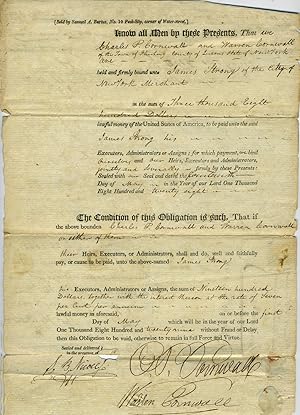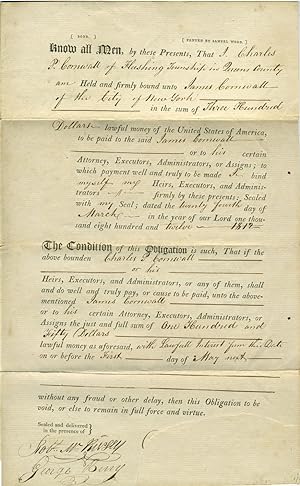cornwall charles james (2 résultats)
Type d'article
- Tous les types d'articles
- Livres (2)
- Magazines & Périodiques
- Bandes dessinées
- Partitions de musique
- Art, Affiches et Gravures
- Photographies
- Cartes
-
Manuscrits &
Papiers anciens
Etat
- Tous
- Neuf
- Ancien ou d'occasion
Reliure
- Toutes
- Couverture rigide
- Couverture souple
Particularités
- Edition originale
- Signé
- Jaquette
- Avec images
- Sans impression à la demande
Pays
Evaluation du vendeur
-
1829 Manuscript Obligations Binding Charles P. Cornwall and Warren Cornwall to James Strong, Merchant of New York
Edité par Flushing, Queens, 1828
Vendeur : Antipodean Books, Maps & Prints, ABAA, Garrison, NY, Etats-Unis
Signé
Etat : Very good condition. Obligation dated May 14, 1828, Flushing, New York. Regarding $1,900 owed to James Strong "of the City of New York, Merchant", at the rate of seven per cent per annum, and signed by Charles P. and Warren Cornwall. Witnessed by S. B. Nicoll. The back of the sheet details the payments to James Strong and Thomas H. Betts. These payments begin in 1830 to Strong; they continue after the bond was assigned to Thomas H. Betts. The last one appears to be have been made on June 19th 1839 "of Benjamin W. Strong, executor of Charles P. Cornwall, $2,038. 94, signed Thos H Betts". This last record of payment affixed to bottom of the original document with wax. A few splits at original folds, 8 x 18". Charles P. Cornwall was a large landowner in Queens in the early 1800s, with Bayside Farm being the most valuable of his properties. In 1838 Cornwall named Thomas Whitson and John Nostrand, his neighbors as trustees, empowered to sell as much of his real estate as was needed to cover his debts and to lease the rest of it to cover his living expenses. They sold Cornwall's Bayside Farm for $15,000 to Samuel Willetts of New York, in 1838. The trustees, using some of the assets from the sale, then made a loan to Elisha Hall of Newburgh for $6,000. Cornwall died in 1839, Hall failed to repay the interest or principal, and the trustees were sued. The case gives an interesting perspective on the value of property in Queens at the time: "His [Cornwall's] preference for farms, over city property, differs from the opinion of most well informed and shrewd capitalists; but it may, nevertheless, be well doubted, whether a farm, situated in a populous neighborhood and near several great thoroughfares, is not safer for a permanent investment than any city property". (Cases in Law and Equity, Supreme Court of the State of New York. Barbour, Oliver L. Vol. XX. New York: Banks and Brothers: 1883. p 142-7.).
-
1812 Manuscript Obligations Binding Charles P. Cornwall to James Cornwall, Merchant of New York
Edité par Flushing, Queens, 1812
Vendeur : Antipodean Books, Maps & Prints, ABAA, Garrison, NY, Etats-Unis
Signé
Etat : Very good condition. Obligation dated March 24, 1812, Flushing Township in Queens County, New York. Regarding $300 owed to James Cornwall of the City of New York, and signed by Charles P Cornwall, although the signature is torn away. Witnessed by Robert W. Rumsey and George Perry. Notes in pencil on verso showing payment of $285.08 in 1826. 7 1/2 x 12 1/2", folded. Charles P. Cornwall was a large landowner in Queens in the early 1800s, with Bayside Farm being the most valuable of his properties. In 1838 Cornwall named Thomas Whitson and John Nostrand, his neighbors as trustees, empowered to sell as much of his real estate as was needed to cover his debts and to lease the rest of it to cover his living expenses. They sold Cornwall's Bayside Farm for $15,000 to Samuel Willetts of New York, in 1838. The trustees, using some of the assets from the sale, then made a loan to Elisha Hall of Newburgh NY for $6,000. Cornwall died in 1839, Hall failed to repay the interest or principal, and the trustees were sued. The case gives an interesting perspective on the value of property in Queens at the time: "His [Cornwall's] preference for farms, over city property, differs from the opinion of most well informed and shrewd capitalists; but it may, nevertheless, be well doubted, whether a farm, situated in a populous neighborhood and near several great thoroughfares, is not safer for a permanent investment than any city property". (Cases in Law and Equity, Supreme Court of the State of New York. Barbour, Oliver L. Vol. XX. New York: Banks and Brothers. 1883. p 142-7.).



